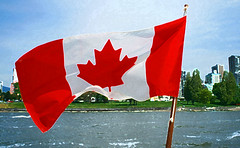Canada is America’s northern neighbor, and many United States citizens enjoy visiting for its natural beauty and a change of pace. There are hundreds of thousands of American citizens who visit Canada each year, and certain rules apply for anyone who wants to cross the border. If you’re interested in traveling to Canada, there are certain things you should be aware of in terms of passport requirements. The U.S. State Department requires all citizens traveling by air to provide a valid passport.
 Because of the 9/11 attacks, the Department of Homeland Security has set forth much stricter requirements in terms of identification. Since June 1st, 2009, the customs border patrol has requested that anyone crossing the border supply a passport. This applies to travel by land, air, or sea, and there are no exceptions, unless you provide a passport card or WHTI compliant document. If traveling from the United States into Canada, travel insurance is highly recommended in the event of a lost passport. This type of insurance should help cover the loss, and assist you in getting a replacement fairly quickly.
Because of the 9/11 attacks, the Department of Homeland Security has set forth much stricter requirements in terms of identification. Since June 1st, 2009, the customs border patrol has requested that anyone crossing the border supply a passport. This applies to travel by land, air, or sea, and there are no exceptions, unless you provide a passport card or WHTI compliant document. If traveling from the United States into Canada, travel insurance is highly recommended in the event of a lost passport. This type of insurance should help cover the loss, and assist you in getting a replacement fairly quickly.
A passport card is valid when traveling between the United States, Mexico, Canada, and the Caribbean. WHTI, or Western Hemisphere Travel Initiative compliant documents can be used in place of a passport. Some examples of these documents include a US military travel ID with corresponding travel orders, a Native American identification card, and U.S. Merchant Mariner documents, along with a few others. It is highly recommended that you find out what kinds of documents are accepted when traveling across the border before you plan a trip, otherwise you may be declined entry and have to return home. Because of the unfortunate increase in child abductions, all adults traveling with children must supply a proof of custody document. In addition, all children must include proof of citizenship, which typically includes a birth certificate or social security card.
While a passport is very important for traveling into Canada from the United States, there are some other factors you should be aware of. Canada may deny entry if you have had a previous drunk driving or other criminal record. In some cases, a waiver can be granted, but it must be approved and submitted several weeks prior to your trip. Naturalized citizens of Canada can enter the country if they provide proof of naturalization. Dual citizens should always approach the border as a Canadian citizen in order to enter. Aside from documentation requirements, people coming into Canada must also meet the nation’s customs requirements. Be sure to look into what is prohibited well in advance before packing. Certain limitations apply to duty-free cigarettes, alcohol, and gifts. Be aware of the country’s current laws on firearms as well before attempting to bring anything across the border for your visit. Things such as obscene magazines, hate-crime related materials, explosive devices, plants, live animals, and meat and dairy products are not allowed. A travel insurance policy is recommended if you plan to stay for any extended period of time.





